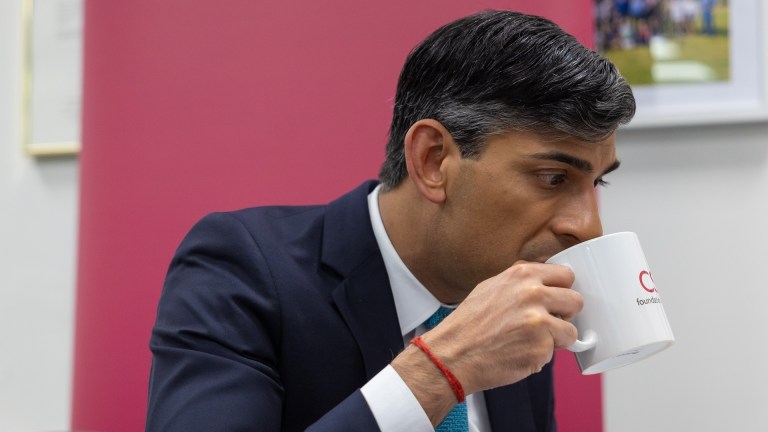Sir Stephen Timms, the Labour MP and chair of the Work and Pensions Committee, has repeatedly pressed the government over its plans for the fund.
He told The Big Issue: “The household support fund – introduced three years ago – has enabled local councils to provide a vital lifeline for families. When the old social fund was abolished ten years ago, it was supposed to be replaced by local welfare assistance from councils. Many councils couldn’t afford to provide it – until the household support fund.
“This has provided a vital last resort safety net for families. Last year, 36% of local welfare assistance was spent on furniture and white goods – allowing a family to replace a broken fridge, for example.
“Families with no recourse to public funds cannot claim benefits, but many councils have been able to help them through the household support fund.”
The DWP permanent secretary wrote to Timms about this in November, confirming that “the department has always been clear that household support fund grant conditions do not prevent support for NRPF individuals”.
Timms added. “If the household support fund ends in March, as currently planned, crisis support will disappear altogether in many areas.”
Inflation may have eased to 3.9% in November – but families are still struggling with the ongoing impact of the cost of living crisis. Prices are still going up and low-income households have nothing left to sacrifice.
Millions of people in the UK are going hungry and cold, sacrificing household basics and unable to pay their bills because the universal credit is not enough to live on, according to the Joseph Rowntree Foundation and Trussell Trust.
Claire Donovan, head of policy at End Furniture Poverty, said: “Discretionary crisis support is a vital part of the welfare safety net, and the household support fund has been helping people during the cost of living crisis since Autumn 2021.
“Local authorities have been using their household support fund allocation in different ways but many have used it to bolster funds for local welfare assistance schemes, another type of discretionary support. In fact last year, 62% of local welfare assistance funding came from the HSF.
“If HSF is not renewed, not only will that vital support vanish, but it will seriously threaten the future of local welfare – leaving people with nowhere to turn in a time of crisis. We urge the government to look again at HSF and renew it for at least a further year. Energy bills are still sky high, food costs are still rising and without crisis support, more people will go cold, go hungry and lose their homes.”
The spokesperson for the DWP claimed the household support fund comes “comes on top of a record cost of living support package worth around on average £3,700 per household”.
They said: “This includes increasing benefits by 6.7% from April, increasing the state pension and increasing the local housing allowance to help private renters on housing benefit or universal credit save nearly £800 on housing costs.
“We have also halved inflation to help everyone’s money go further and cut taxes for hardworking people at the Autumn Statement – saving the average earner £450 a year.”
But charities have repeatedly stressed that the DWP’s cost of living support is not stretching far enough to help low-income households who are struggling to cope, as The Big Issue has extensively reported.
A total of nine nine million adults experienced food insecurity in June 2023, the Food Foundation reports, while three million reported not eating for an entire day because they could not afford food. And record numbers are being forced to turn to food banks for help.
Sabine Goodwin, director of the Independent Food Aid Network, said: “The uncertainty around the household support fund’s extension must end immediately. People should be able to access crisis support in every part of the UK.
“And local authorities urgently need reassurance that they will be able to provide help especially when social security payments and wages are too low. What’s more, food banks cannot possibly be expected to cope with the impact of its removal.”
The household support fund was already failing to stretch far enough, as The Big Issue previously reported.
There are 14.4 million people living in poverty in the UK, according to the government’s most recent statistics. If you divide the household support fund up between them (worth £500 million for this financial year), it’s less than £35 each for the whole year. That’s not even enough to cover a family’s weekly food shop.
Laura Burgess, Senior Policy and Research Advisor at Greater Manchester Poverty Action (GMPA), said: “The HSF has been vital in recent years in enabling local councils to support residents experiencing poverty and the cost of living crisis.
“Through our work with local authorities across Greater Manchester, we understand that without the fund, some councils will be unable to deliver crisis support services which provide a safety net to vulnerable residents facing hardship. At GMPA we continue to call on the government to commit to long-term funding for crisis support and a long-term strategy for tackling poverty across the country.”
Councils have expressed their concerns around the household support fund being axed. Islington Council has written to the chancellor to “urgently request the continuation” of the fund, which is “vital” for residents on the lowest incomes.
“This has included around half of the funding being used to tackle holiday hunger,” the council said. “We have used the remaining funding to support a range of overlooked households.”
Councillor Diarmaid Ward, deputy leader of Islington Council and executive member for finance, Planning and performance, said: “In Islington, we’ve used the household support fund to pay for vital support including work to tackle holiday hunger, and support for low-income pensioners and care leavers.
“Despite the ongoing cost of living crisis, the Autumn Statement didn’t mention whether the household support fund will continue from next April, which has caused local concerns, especially given the wider issue of Government underfunding for key local services.
“We’ve written to the chancellor to urge the government to continue the household support fund into 2024/25, and to take into account the impact on our residents who rely on this support in these very difficult times for so many.”
Local authorities have spent 37% of the fund on school meal vouchers for families during the school holidays. Not every council did this but it was the largest spending category for the household support fund that the DWP recorded, and it was vital for the millions of children currently living in poverty – ensuring they were guaranteed a nutritious meal.
There are fears that an end to the household support fund will exacerbate child poverty. Lynn Perry MBE, the chief executive of Barnardo’s, said: “The household support fund is a vital part of how local authorities help those most in need. Across the UK, families are struggling to pay their bills or feed their children – often borrowing money and taking on debts just to get through another week. Local crisis support is a crucial part of the social safety net and it’s vital that it continues.
“The fund ends in March 2024, so time is running out. If it isn’t extended, it will leave a major hole in support which neither local government, nor the voluntary sector, will be able to fill. We’re urgently calling for a commitment to increase and extend the fund by three more years, as well as a long-term strategy for local crisis support in England, to help alleviate the pressure on families.”
Amanda Bailey, director of the North East Child Poverty Commission, said: “In the absence of a national social security safety net that guarantees all families – whether in or out of work – can at least afford everyday essentials, HSF has provided thousands of low income families across the North East with a lifeline to help them meet their children’s basic needs.
“We know it’s also really strengthened partnerships between councils and voluntary and community organisations in our region, and has acted as gateway to a range of other advice and support for families.
“It’s vital the chancellor confirms the extension of HSF beyond March as we’re deeply concerned about the massive gap in hardship support this will leave, which local authorities and voluntary and community sector partners in our region – facing enormous financial pressures and still unprecedented levels of need – simply will not be able to fill. He must also do this as quickly as possible, to enable councils and VCS organisations to properly plan the most effective delivery of this support.
“With one of the very highest rates of child poverty and destitution in the country, the implications of failing to extend HSF are potentially extremely serious for families and children across the North East.”
Councillor Pete Marland, chair of the Local Government Association’s economy and resources board, added: “Without an extension, there is a risk of more households falling into financial crisis and homelessness. It would create a cliff-edge in provision that councils simply will not be able to fill. Councils are also warning that without urgent certainty on its future, they will have to start issuing redundancy notices to staff who administer the fund over winter, at the time when residents most need support.
“Ultimately, councils want to shift the focus from providing crisis support to investing in preventative services that can improve residents’ financial resilience. But with immediate demand not reducing, this funding needs to continue beyond March to keep residents safe and well, prevent escalating crises and reduce pressure on public services.”
Do you have a story to tell or opinions to share about this? We want to hear from you. Get in touch and tell us more.









